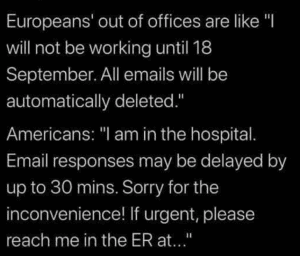This is part of our series on IWT’s 4-Day Workweek Challenge, where we take you behind the scenes to show what it’s like for us as we test out a compressed work schedule. The email you’re about to read is written by Tony Ho Tran, a professional journalist for The Daily Beast and a former copywriter for IWT. Join us as we dive deep on the highs and lows of the challenge.
There’s an alarming condition spreading through the American workplace. It affects workers, causing them to develop symptoms such as stress, burnout, and the dreaded “Sunday Scaries.”
If this sounds familiar, you might be suffering from a common issue called PTO Anxiety. This condition happens when you NEVER take time off work. Instead, you hoard your vacation days like a dragon with their gold.
You might do this because of pressures at work or even fear that you might need them in the future…when in reality, all you’re doing is setting yourself up for a pile of unused PTO days at the end of the year.
That means you’re losing money and — worst of all — your time and mental well-being.
“I hardly took time off — not because it wasn’t available,” Frank Matos, IWT’s tech lead, says. “It was always available and I was always encouraged to use it. But I just felt scared to take it. I felt anxious and scared to take time off.”
Frank’s story is sadly a common one. A Pew Research report released in 2023 found that nearly 46% of Americans surveyed didn’t take all of their available time off last year. That means nearly half of workers are leaving valuable vacation time and money on the table — despite the fact that their employers offer it to them as part of their job.
Of those, 52% say they “don’t feel the need to take more time off” and 49% are worried that “they might fall behind at work.”
Frank fell in that latter 49%. Instead of taking time off work to simply enjoy his days, he’d work instead. In his mind, the consequences of him taking a personal day far outweighed any benefits.
“I always worried that if I wasn’t there, then the thing that I was responsible for would fall apart — and my world would end,” he says.
The 4-Day Workweek mental shift
So when IWT began implementing a 4-day workweek (4DWW), Frank was excited — but also a little scared. He recently took on a senior position at the company. That meant that he was responsible for managing vendors and contractors.
Not only did he have to deal with the anxiety of missing his own work, he also had to manage expectations of a new role and managing others on top of a compressed workweek.
“I was nervous,” he says. “I kept thinking, ‘What happens when everyone’s gone? What happens when the site goes down? What happens if there’s an emergency?’ That kind of anxiety kicked in.”
Luckily, none of that has happened (knock on wood). Instead, what actually ended up happening was nothing short of amazing: The 4DWW Challenge triggered what Frank calls a “mental shift.”
Instead of worrying about putting out imaginary fires or what might happen if there was a tech emergency, he enjoyed his days off. In fact, it even emboldened him to finally take advantage of his PTO days and plan even more vacations in the future.
It’s not just him either. He says that he’s noticing changes happen throughout the entire company.
“I feel like the 4-day workweek was truly a mental shift for IWT,” he says. “We’re trying to make sure that we’re living Rich Life values ourselves. So it’s easier for me to be okay with leaving and having those days off.”

Luckily, he and the rest of the team have a detailed system in place to make the transition to 4DWW as smooth as possible — and with little growing pains.
For Frank, there were three things specifically that helped him the most when it came to the 4DWW transition.
The first was developing a playbook. Think of it like an old-school video game manual that shows you all the cheat codes and guides to get past tough levels — but for everyone’s job at IWT. If there was any emergency or something came up, anyone at the company could refer to each individual employee’s playbook and take care of the issue while they’re out of office.
“Say I’m gone, and something goes wrong in tech land, then no one has to worry,” he explains. “I have everything written out so someone can reach out to all the different vendors and contractors to get support. That helped out a ton with anxiety.”
The second was doubling down on project planning. Instead of taking things day-by-day and tackling projects piecemeal, Frank has had to get better at anticipating each facet of his workload weeks in advance.
“I’m definitely trying to get the bigger picture more versus my usual tunnel vision of getting through my normal tasks,” he says.
That meant getting better at communicating with vendors and contractors. It also meant improving how he managed expectations and deadlines so he never found himself needing to stay late or having to come in on his day off.
This might sound like a lot more stress at first blush, but it’s actually helped him grow in his role in ways that he didn’t expect at all.
“This has definitely accelerated my growth with project planning,” he says. “I’m in a mindset that sees how this skill would really benefit me right now, so I need to kick it into high gear to learn it.”
Last, Frank was staying motivated. This ended up being incredibly easy. After all, if an extra day off each week was on the line, you’d be motivated too.
Like Nasrin, who we talked to last week, this injected urgency into his work. Notice the wording. Urgency doesn’t mean stress. It doesn’t mean frantically rushing through your work because you have one less day to do it.
Urgency is a more positive and powerful motivator that allows you to get work done more efficiently — and save a ton of time in the process. It imbues all of your tasks with energy and importance, allowing you to get things done in a fraction of the time it would normally take.
“The 4-day workweek didn’t add stress to get all my work done,” he says. “It just added motivation. I want to enjoy my day off. I don’t want to have to worry about things that need to get done. So I do all this planning ahead of time so that things go smoothly.”
Swift travels
The Frank you’d meet today isn’t the same guy who joined IWT six years ago. He’s more calm, less anxious, and a whole lot more skilled.
He’s also not afraid to actually use his PTO days, unlike when he first came aboard the company. In fact, he’s flying out to Los Angeles in August to enjoy a few days under the Southern California sun with his wife.
Oh, and to catch a Taylor Swift concert.
“To be clear: She’s gonna go see Taylor Swift with a friend. I’m just coming to LA to appreciate LA,” he claims (sure, Frank, sure). “But that’s kind of where the 4-day workweek fits in. I’m not afraid to take those days off anymore whereas before, I would have been.”
Frank adds that the 4DWW Challenge has even helped him grow in other unexpected ways too. The extra days have not only given him more of an opportunity to relax, but he’s also been able to reassess his entire relationship with work and where he wants to be in the future.
“I started working immediately after college,” he says. “So I’ve never really sat down and tried to figure out what exactly it is I want from work. My wife and I talked recently about where we want our work lives to be in our forties and fifties. With the 4-day workweek, my stress levels have gone down enough where I’m able to slow down and ask myself these questions.”
Do us a favor: Schedule some PTO time after reading this email. You have our permission to do so.
Take time for yourself. Take time because it’s there and it’s your right to do so.
More importantly: Take time because you deserve it.


